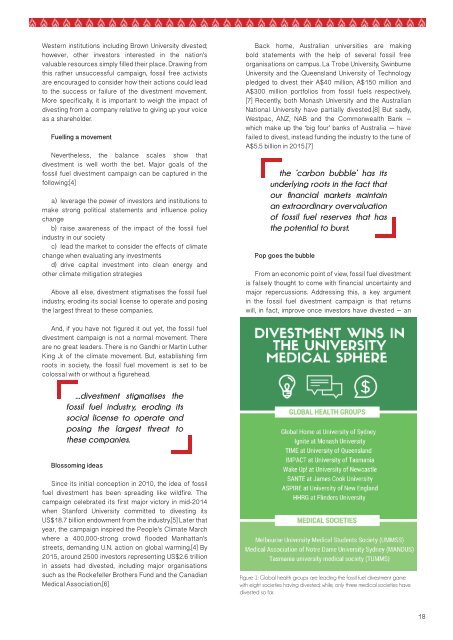Vector Volume 11 Issue 2 - 2017
Create successful ePaper yourself
Turn your PDF publications into a flip-book with our unique Google optimized e-Paper software.
Western institutions including Brown University divested;<br />
however, other investors interested in the nation’s<br />
valuable resources simply filled their place. Drawing from<br />
this rather unsuccessful campaign, fossil free activists<br />
are encouraged to consider how their actions could lead<br />
to the success or failure of the divestment movement.<br />
More specifically, it is important to weigh the impact of<br />
divesting from a company relative to giving up your voice<br />
as a shareholder.<br />
Fuelling a movement<br />
Nevertheless, the balance scales show that<br />
divestment is well worth the bet. Major goals of the<br />
fossil fuel divestment campaign can be captured in the<br />
following:[4]<br />
a) leverage the power of investors and institutions to<br />
make strong political statements and influence policy<br />
change<br />
b) raise awareness of the impact of the fossil fuel<br />
industry in our society<br />
c) lead the market to consider the effects of climate<br />
change when evaluating any investments<br />
d) drive capital investment into clean energy and<br />
other climate mitigation strategies<br />
Above all else, divestment stigmatises the fossil fuel<br />
industry, eroding its social license to operate and posing<br />
the largest threat to these companies.<br />
Back home, Australian universities are making<br />
bold statements with the help of several fossil free<br />
organisations on campus. La Trobe University, Swinburne<br />
University and the Queensland University of Technology<br />
pledged to divest their A$40 million, A$150 million and<br />
A$300 million portfolios from fossil fuels respectively.<br />
[7] Recently, both Monash University and the Australian<br />
National University have partially divested.[8] But sadly,<br />
Westpac, ANZ, NAB and the Commonwealth Bank –<br />
which make up the ‘big four’ banks of Australia — have<br />
failed to divest, instead funding the industry to the tune of<br />
A$5.5 billion in 2015.[7]<br />
the ‘carbon bubble’ has its<br />
underlying roots in the fact that<br />
our financial markets maintain<br />
an extraordinary overvaluation<br />
of fossil fuel reserves that has<br />
the potential to burst.<br />
Pop goes the bubble<br />
From an economic point of view, fossil fuel divestment<br />
is falsely thought to come with financial uncertainty and<br />
major repercussions. Addressing this, a key argument<br />
in the fossil fuel divestment campaign is that returns<br />
will, in fact, improve once investors have divested – an<br />
And, if you have not figured it out yet, the fossil fuel<br />
divestment campaign is not a normal movement. There<br />
are no great leaders. There is no Gandhi or Martin Luther<br />
King Jr. of the climate movement. But, establishing firm<br />
roots in society, the fossil fuel movement is set to be<br />
colossal with or without a figurehead.<br />
...divestment stigmatises the<br />
fossil fuel industry, eroding its<br />
social license to operate and<br />
posing the largest threat to<br />
these companies.<br />
Blossoming ideas<br />
Since its initial conception in 2010, the idea of fossil<br />
fuel divestment has been spreading like wildfire. The<br />
campaign celebrated its first major victory in mid-2014<br />
when Stanford University committed to divesting its<br />
US$18.7 billion endowment from the industry.[5] Later that<br />
year, the campaign inspired the People’s Climate March<br />
where a 400,000-strong crowd flooded Manhattan’s<br />
streets, demanding U.N. action on global warming.[4] By<br />
2015, around 2500 investors representing US$2.6 trillion<br />
in assets had divested, including major organisations<br />
such as the Rockefeller Brothers Fund and the Canadian<br />
Medical Association.[6]<br />
Figure 1: Global health groups are leading the fossil fuel divestment game<br />
with eight societies having divested; while, only three medical societies have<br />
divested so far.<br />
18

















